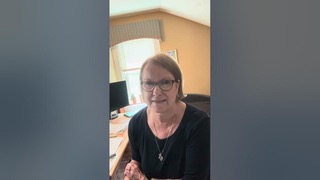Reflection for Sunday – July 13, 2025
Readings: Deuteronomy 30:10-14; Colossians 1: 15-20; Luke 10: 25-37
Preacher: Cathy (Kamp) Glisson
The Good Samaritan. For centuries, Luke’s parable has prompted Christians the world over to reflect and ask: Who is my neighbor? How am I called to treat my neighbor with the mercy of Jesus?
The parable and questions have never been more relevant than they are today. In our divisive society, it’s tempting to stay away from the question, Who is my neighbor? Like the scholar in the parable, when we do ask the question, we might be looking to justify our response.
For answers and justification, we need look no further than how Jesus responded. To the question about how best to look forward to eternal life, Jesus affirmed the answer: “You shall love the Lord, your God, with all your heart, with all your being, with all your strength, and with all your mind, and your neighbor as yourself.”
Jesus’ assurance that this was the correct response wasn’t enough for the scholar. He wanted Jesus to define who is really a neighbor, who does he really have to love as much as he loves himself. The story of the Samaritan traveler illustrates Jesus’ teaching.
The Samaritan is moved with compassion by the half-dead victim of violent robbers while a priest and a Levite pass by the man in the street. It takes an outsider to teach us what mercy is all about. The Samaritan did more than donate money to the man’s plight (though he did that, too). He tended to the man’s messy wounds; he lifted him up; he gave him shelter at an inn; he cared for him; and when he had to move on, he arranged for the innkeeper to continue the work he had begun.
The Samaritan, Jesus tells the scholar, is the one in the parable who teaches us what it means to be a merciful neighbor. It’s about getting involved, not passing by. It’s about getting close, being willing to enter into the suffering of another person. It’s about encountering and caring. It’s about practical hands-on care. It’s about sharing from our abundance. And it’s about putting sustaining measures in place. It’s about advocating for those whose voices go unheard.
We are called today to be neighbor to so many. So many are being left at the side of the road: People in war-torn and impoverished countries; people who are already food insecure; people who need healthcare; people who are seeking refuge from unsafe conditions; people working hard at low-paying jobs and struggling to pay the rent. These are our neighbors today – globally and locally. How will we show mercy to our neighbors?
If we could ask Jesus today, I wonder if he would again tell a parable like the Good Samaritan. If you are wondering where the Catholic Church stands on caring for our neighbors, you could search for the U.S. Bishops or Pope Leo’s responses to the loss of foreign aid or mass detention and deportation or cuts to SNAP and Medicaid. Their responses are as clear as the message of the Good Samaritan: Our neighbors are those who will suffer when we do not put human needs first.
Today each of us needs to search our own hearts for how we are being called to be the face of Jesus’ mercy to others. How can I tend to another’s wounds? How can I care for the ones that others want to leave at the side of the road? How can I make sure my efforts will be sustained to make a meaningful difference? What will I do?
Moses’ advice in Deuteronomy might be helpful as we reflect on our call today. Moses reminds us to heed the voice of the Lord and to keep his commandments, to return to the Lord with all our hearts and souls. And Moses reminds us that the answers we seek are not so mysterious or remote. “No,” says Moses. “It is something very near to you, already in your mouth and in your hearts; you only have to carry it out.”
Moses direction is much the same as Jesus’ directive at the end of the parable of the Good Samaritan. “Which of these three, in your opinion, was neighbor to the robbers’ victim?” And the answer is “the one who treated him with mercy.” Jesus then says: “Go and do likewise.”
- Reflection for Sunday – July 13, 2025 - July 9, 2025
- Reflection for Sunday – March 30, 2025 - March 25, 2025
- Reflection for Sunday – October 27, 2024 - October 23, 2024



Comments are closed.